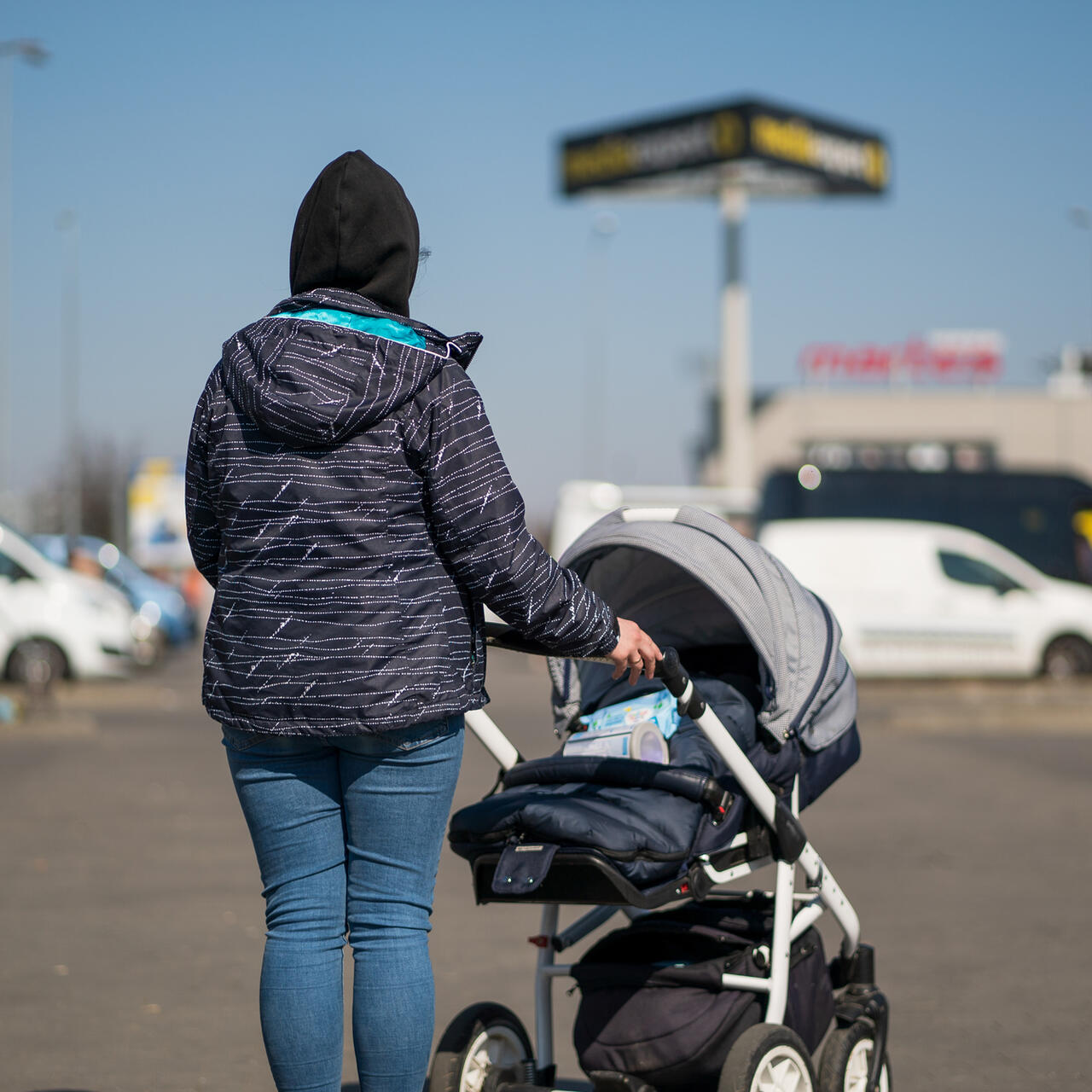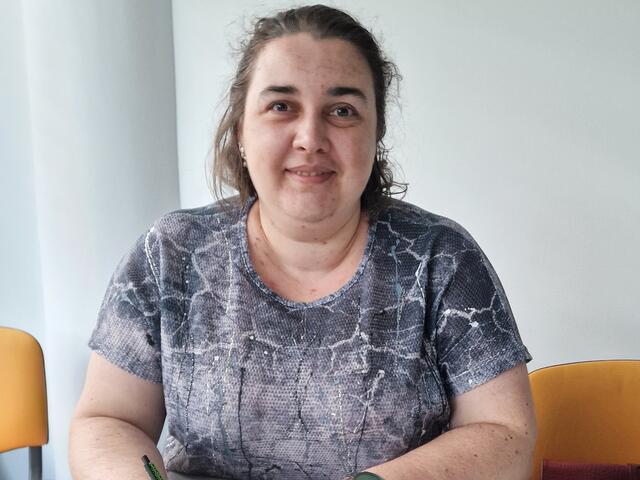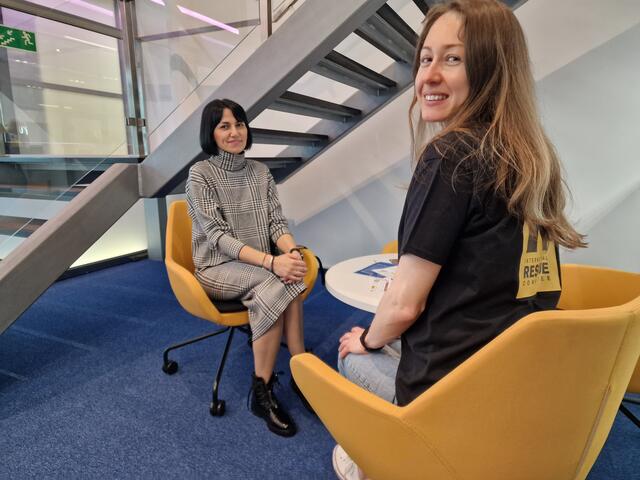
What is it like to find a job after fleeing war?
Meet Yana and Lubov, Ukrainian refugees who are rebuilding their lives in Poland and striving to provide for their families.

Meet Yana and Lubov, Ukrainian refugees who are rebuilding their lives in Poland and striving to provide for their families.
Yana was managing a private medical clinic. Lubov was a former engineer. After fleeing the war in Ukraine, both are determined to rebuild their families’ lives in Poland.
Having already experienced conflict and devastation, refugees like Yana and Lubov are then faced with navigating a new national system, finding employment and long-term accommodation and integrating in their new communities—all made infinitely more challenging with a language barrier.
Below, get to know their stories and learn how they have been supported by the "One Step to Employment" program, run by Fundacja Innowacja i Wiedza (Foundation of Innovation and Knowledge), in partnership with the International Rescue Committee in Poland.
Yana Stepantsova fled from Kyiv, Ukraine's capital, with her two daughters: Zlata, 3, and Viktoriia, 15, just after the escalation of war. “When I was escaping from war with my children, I had planned to drive to Germany, to stay with my friend,” she says. “But my grandfather lived in Wroclaw and put me in contact with his friends in Zory so we stayed there. When I stayed with them for one night, I felt so at home and didn't want to go any further. They were offering us Canada, USA, Germany, but I felt comfortable here.”
Despite this, these first months took a lot of adjustment. “The place we lived in Zory was near the fire station and when there were sirens, my younger daughter would hide under the desk,” Yana recalls.
“We did not know many things: how to sign in to kindergarten, how to find work. But many people helped us. We are grateful to the family who hosted us. We lived with them for two months and then when I felt I could be okay on my own, we moved out.”
At this point, Yana was able to scrape together enough savings for her and her children to move to Katowice, about an hour’s drive away, where there were more options for her eldest daughter to attend high school. But she was becoming increasingly aware of the urgent need to find work to provide for her family.
“It was difficult to find a job, because my younger daughter is 3 years old and she goes to kindergarten and I need to pick her up at 3pm,” Yana explains. “I started to do language courses and other skills courses—I understood that I have to learn something to be competitive on the labor market and compete with Polish candidates.”
Ukrainian workers are not new to Poland’s economy. Prior to the escalation of the war, over 1 million were employed in the country.
Currently, most of the registered 1.5 million refugees from Ukraine are women, who may face particular challenges taking care of children and coping with the traumatic effects of displacement while trying to provide for their family and navigate new systems.
To break into the labor market, Yana decided to enroll in the One Step Center. In May, she secured an interview for a position as a clinic’s administrator.
“The workshops I participated in [at the One Step center] gave me a lot of support and I can say I stand surely on my own two feet,” Yana says. “I was going into the interview presenting myself as a qualified candidate that can offer my skills and experience. I was very confident.”
The job counselors at One Step to Employment helped Yana work on her CV and application, as well as providing psychological support to improve her confidence. Through this, Yana was able to advocate for the salary she needs to pay her rent and provide for her two children.
“When I told my friend from Poland how the interview went he was surprised—‘You really told them you want that much money? Weren’t you afraid?’ I said no, because I know what I can offer and I know what I need.”
When she spoke with the IRC, Yana was waiting to hear back on a job offer. Though she had yet to receive an offer, she was proud of her confidence and ability to advocate for herself. “I want a stable job that I can do with heart and satisfaction,” she says. “Because now I feel my potential is wasting and I know I can do more for people.”

“I learned about your center in March, when I had been living in Poland for six months,” says Lubov, 40, who left eastern Ukraine for Poland in August 2022. Lubov graduated as an engineer but has worked as a sales manager, operator and in several other roles.
She came with her 18-year old daughter and their dog, while her husband stayed behind in Kyiv. “In the beginning, it was strange,” says Lubov. “We lived for almost two months in a hotel. It was a 5-floor building with long corridors and small rooms. And there was no fridge, even the tiny bar fridge.”
“I watched films in Polish, I was listening to music in the Polish language. But I did not have anyone to talk with except my daughter. And I also understood that we will not come back to Ukraine soon," she recalls. "I didn’t even know how to approach my neighbors—if I visit someone, should I bring something with me? I did not know the local customs.”
It was at this point that Lubov saw an ad for the One Step to Employment program, and was excited by the opportunity to learn better Polish and receive support in finding work.
“All the training that I saw, I attended,” says Lubov, which meant participating in everything from intercultural workshops to financial literacy training, psychosocial skills to CV writing. But her favorite part has been being able to practice her Polish: “I can hear the language and see the writing. I was recording those meetings, returning home and listening to them again with my daughter.”
Visiting the center also helped Lubov build a sense of community, as she became friends with several women attending the same workshops. “We created a Telegram group so we can stay in touch,” she notes. “And we send each other different opportunities and courses we find.”
“Now I feel comfortable here; I realize I have possibilities to grow—I see that other older people are working and it gives me hope.”

“Looking for employment is challenging for everyone, especially for newcomers in the country, who need to learn how to navigate in the new system, regulations and labor market,” says Alan Moseley, the IRC’S country director in Poland. “We aim to encourage people who have fled the war and are trying to rebuild their lives to become confident job seekers, who are aware of the strengths they can offer their potential employers.”
As the war in Ukraine has no end in sight, our employment centers in Poznań and Katowice, funded by DEC and UK Aid, offer people support to make informed decisions about their future and help them integrate within the local society. This includes providing access to long-term accommodation, help with navigating the national system, understanding your rights and finding stable employment. Those attending can opt to take Polish language courses, vocational training, as well as CV making and job-matching services.
We also reach out to those who are still in Ukraine but thinking about leaving the country, to enable them to make more informed decisions.